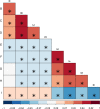Impact of the covid-19 pandemic on mental health and sexuality of female doctors
- PMID: 37428737
- PMCID: PMC10332575
- DOI: 10.1371/journal.pone.0281321
Impact of the covid-19 pandemic on mental health and sexuality of female doctors
Abstract
Background: COVID-19 pandemic has changed people's lives around the world due to restrictive measures adopted by governments. The impact of this change on female sexuality needs to be further investigated, particularly between female doctors who are more at risk as they are directly involved with health care services.
Methods: An online survey has been filled out by female doctors. The questionnaire evaluates sexual function, depression, anxiety, burnout, sociodemographic and professional data, and it was answered during the peak of COVID-19 pandemic in Brazil. The main outcome is female doctors' sexual function during COVID-19 pandemic, which was evaluated by analyzing FSFI questionnaires. The secondary outcome is related to their mental health, assessed via depression, anxiety and burnout questionnaires.
Results: A sample of 388 female doctors filled out the questionnaire. The median age was 34.0 (29.0, 43.0) years old. The total FSFI median score was 23.8 [18.9, 26.8] with desire domain median of 5.0 [3.0, 7.0]. In our sample, 231 (59.5%) women had depression and/or anxiety, out of these, 191 (82.7%) had depression and 192 (83.2%), anxiety. From these samples of doctors with depression and/or anxiety, 183 (79.2%) had sexual dysfunction.
Conclusion: This finding suggests that doctors are experiencing a high risk of sexual dysfunction and mental illness during the COVID-19 outbreak. A high index of depression and/or anxiety was shown in the studied population, with almost 80% of them reaching criteria for sexual dysfunction. Working in the frontline is related to worse mental health conditions. Depression and anxiety were found as potential mediators of burnout effect on sexual function.
Copyright: © 2023 de Souza Ziegler et al. This is an open access article distributed under the terms of the Creative Commons Attribution License, which permits unrestricted use, distribution, and reproduction in any medium, provided the original author and source are credited.
Conflict of interest statement
The authors have declared that no competing interests exist.
Figures


References
-
- Mancio Ferreira da Luz E, Lopes Munhoz O, Morais BX, Bitencourt Toscani Greco P, S, Magnago TSB de S. Repercussões da Covid-19 na saúde mental dos trabalhadores de enfermagem. Rev Enferm Cent-Oeste Min [Internet]. 2020. Oct 1 [cited 2022 May 26];10. Available from: http://seer.ufsj.edu.br/index.php/recom/article/view/3824
Publication types
MeSH terms
LinkOut - more resources
Full Text Sources
Medical

